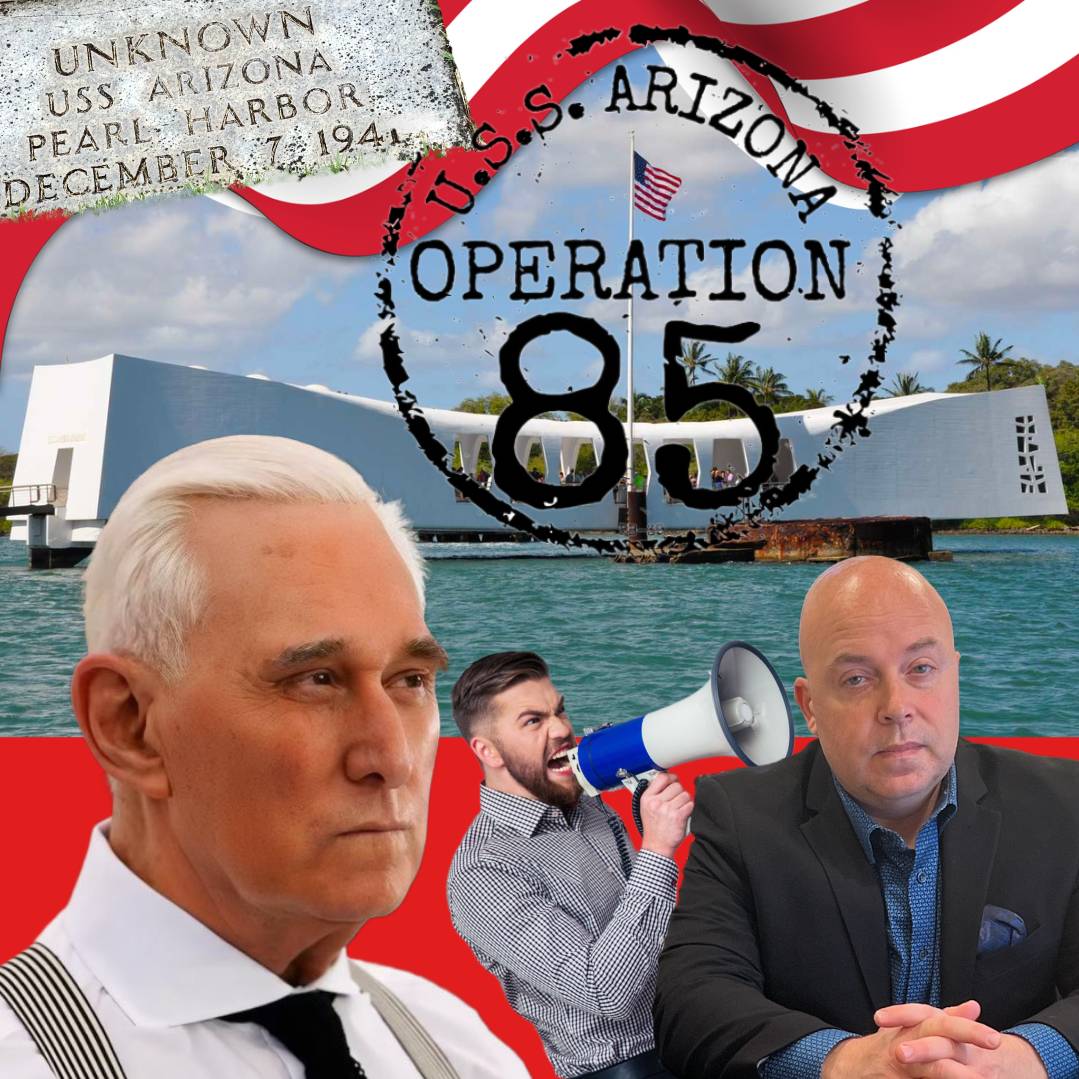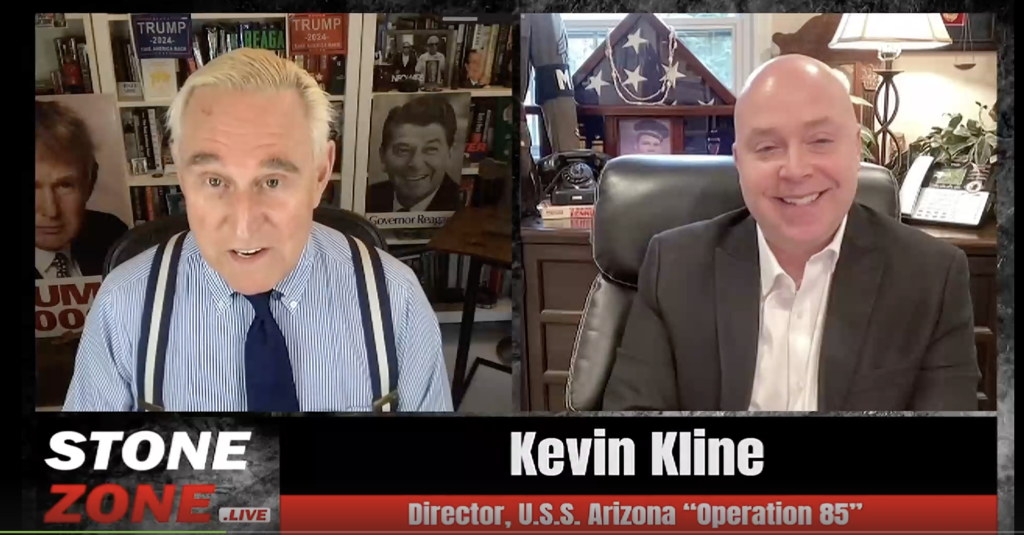Roger Stone; An Unforeseen Ally of Pearl Harbor Unknowns

Roger Stone; An Unforeseen Ally of Pearl Harbor Unknowns
In a surprising twist, Roger Stone’s internet podcast The Stone Zone and WABC radio show played a pivotal role in the ongoing success of Operation 85, proving that when it comes to honoring our heroes, politics should take a back seat.
Operation 85, a civilian-led initiative with a noble mission, aims to identify more than 85 unknown American servicemen from the U.S.S. Arizona who were killed during the attack on Pearl Harbor. These brave souls were removed from the ship and buried in commingled graves at the National Memorial Cemetery of the Pacific, marked as “unknown.” The majority of the service member’s surviving family were unaware that remains of the U.S.S. Arizona crew were anywhere else other than within the sunken battleship or beneath the Memorial at Pearl Harbor, HI. Enter Kevin Kline, the Executive Director of Operation 85, whose dedication to the awareness and a resolution of the U.S.S. Arizona unknowns has led to groundbreaking progress, even in the face of significant challenges.
But perhaps one of the most surprising aspects of Operation 85’s journey is the involvement of Roger Stone, a figure well-known in political circles for his close ties to President Donald J. Trump and his role as a provocateur in the history of modern American politics going back to President Richard Nixon. Stone’s reputation might be considered questionable by some, and his name often sparks strong reactions from both his supporters and detractors. However, in this case, Stone’s platform played an instrumental role in advancing the mission of Operation 85, demonstrating that some causes transcend political boundaries.
The Roger Stone Connection
Kevin Kline’s appearance on Roger Stone’s WABC Radio Show and Roger’s internet podcast, “The Stone Zone,” in January 2024, was one of many turning points for Operation 85. Despite the potential controversy of associating with Stone, Kline never hesitated to take the opportunity. “For me, it was never a controversial decision,” Kline said. “The mission is too important. Roger’s shows gave us a platform to reach a larger audience, and the results speak for themselves.”
The impact of Kline’s interviews was significant. Soon after the 30-minute radio show and the nearly hour-long podcast aired, Kline was able to connect with 15 new family members of the U.S.S. Arizona’s crew, leading to the submission of DNA Family Reference Samples to the US Navy and US Marine Corps Casualty Offices, which resulted in representation of eight new crew members from the U.S.S. Arizona. These DNA reference samples are crucial for the identification process, as the Department of Defense requires DNA samples from 60% of the 1,072 missing crew members to begin disinterment and identification efforts.

Kline acknowledged that Stone’s involvement was instrumental in this success. “Roger went out of his way to be helpful and didn’t mention politics once during our 90 minutes together,” Kline joked. “It must have been hard for him to not talk politics for 90 minutes straight, but he did it for us, and because of that, we’re eight steps closer to identifying these heroes.”
A Controversial Figure in a Unified Mission
Despite the success, not everyone was pleased with Kline’s decision to appear on Stone’s shows. One family member, in particular, was so upset by the association that they requested to be removed from all future correspondence with Kline and Operation 85. Kline, however, handled the situation with grace. “It’s unfortunate that my appearance on the show or association with Roger Stone in any way triggered that family member to the point where they felt the mission was less important than the message, and who was saying it,” Kline reflected. “Roger was helping us send the message out to his large audience, and it was both helpful and impactful. This is not a divisive issue, and the fact that someone took it there shows how deeply divided this country really is.”
Kline’s sentiment underscores a critical point: when it comes to honoring the sacrifices of our servicemen and women, political affiliations should not matter. The mission of Operation 85 is purely about bringing closure to the families of those who gave their lives in service to our country. It’s a mission that should unite us as Americans, regardless of our personal political beliefs.
The Mission of Operation 85
To fully appreciate the significance of Kline’s appearance on Roger Stone’s shows, it’s important to understand the broader mission of Operation 85. On December 7, 1941, the U.S.S. Arizona was tragically sunk at Pearl Harbor, resulting in the loss of 1,177 crew members. While many of these servicemen were either cremated in the explosion or remain trapped within the ship’s wreckage, a significant number of remains were recovered but could not be identified at the time. These remains were eventually reinterred in commingled graves at the National Memorial Cemetery of the Pacific, marked as “unknown.”
In 1947, the American Graves Registration Service (AGRS) attempted to identify these remains, but due to the limitations of the time, many were still left unidentified. Today, with advances in DNA technology, there is renewed hope that these unknowns can finally be identified, bringing much-needed closure to their families.
Kline, who is the grand nephew of one of the missing crew members from the U.S.S. Arizona has taken up the challenge of locating and soliting DNA Family Reference Samples from the families of the USS Arizona’s crew members. The Department of Defense has set a threshold of 60%, meaning that DNA samples from at least 643 crew members must be on file before disinterment can even be considered. When Operation 85 began in April of last year, there were only 18 crew members of the U.S.S. Arizona with family DNA samples on file. Thanks to their relentless efforts, that number has now grown to over 400 crew members represented with family DNA, with new family samples being processed every day.
The organization’s success is even more impressive when considering the obstacles they’ve faced. The Defense POW/MIA Accounting Agency (DPAA), which is responsible for identifying and recovering missing American service members, never had any plans in place to identify the unknowns from the the U.S.S. Arizona, and had been slow to officially acknowledge Operation 85’s efforts, despite the initiative’s success. Kline has met with DPAA officials multiple times, but no official announcements have been made regarding an official partnership.
Yet, despite these challenges, Operation 85 continues to press forward. They’ve connected with over 1,000 family members of the missing crew and have helped the Navy and Marines facilitate viable DNA samples for more than 780 of them. Their efforts have been both efficient and cost-effective, proving that with dedication and the right approach, significant progress can be made.
Putting Politics Aside for the Greater Good
Kline’s experience with Roger Stone is a reminder that, sometimes, we need to put our differences aside for the greater good. The mission of Operation 85 is about honoring the fallen, not about politics. “There was never anything political about the mission or the project,” Kline said. “I would have happily gone on any left-leaning media podcast or news outlet to tell our story, but I wasn’t invited. Roger Stone gave us a platform when no one else would, and for that, I’m grateful.”
In a time when our country feels more divided than ever, it’s important to remember that some issues transcend politics. The resolution and eventual identification of the U.S.S. Arizona’s unknowns is one of those issues. It’s a cause that should bring us together as Americans, united in our respect and gratitude for those who made the ultimate sacrifice.
Kline’s appearance on Roger Stone’s shows may have been controversial to some, but it was undeniably effective. It brought Operation 85 closer to achieving its goal and reminded us all that, sometimes, the most important thing is not who delivers the message, but the message itself.
Kevin’s appearance on the StoneZone Show and Roger’s WABC radio show is below. We’ll let you judge for yourself.
